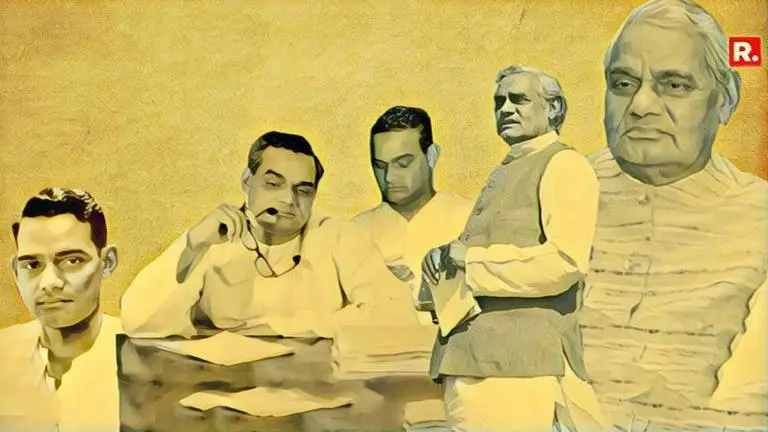Updated 16 August 2018 at 20:51 IST
Highlights from former Prime Minister Atal Bihari Vajpayee illustrious political career
From being arrested by the British during the final years of the 'Raj', to being praised by no less than Jawaharlal Nehru, to becoming the first non-Congress Prime Minister to complete a full and term, here are the highlights of Atal Bihari Vajpayee political career
- India News
- 0 min read

Even though he's not been politically active for almost a decade, during which the BJP has come to become the dominant force in Indian politics, the significance of the efforts and political influence of former Prime Minister Atal Bihari Vajpayee is hard to understate. From being arrested by the British during the final years of the 'Raj' to being praised by no less than Jawaharlal Nehru, from becoming the first non-Congress Prime Minister to complete a full term, here are some of the highlights of Atal Bihari Vajpayee's political career:
Read: Former Prime Minister Atal Bihari Vajpayee In “critical” Condition: AIIMS Bulletin. UPDATES Here
FIRST EXPOSURE TO POLITICS:
In 1942, Atal Bihari Vajpayee along with his elder brother Prem was arrested for over three weeks for participating in the Quit India Movement against the British. This was Vajpayee's first exposure to politics. In 1951, Vajpayee was appointed as a national secretary of the newly formed Bharatiya Jana Sangh for the Northern region based in Delhi. He soon became a follower and aide of party leader Shyama Prasad Mukherjee.
ELECTORIAL HISTORY:
In his political career, Atal Bihari Vajpayee was elected ten times as Member of Parliament from different Lok Sabha constituencies:
Advertisement
Balrampur (Lok Sabha constituency)
1957-62: Second Lok Sabha election
Advertisement
1967-71: Fourth Lok Sabha election
Gwalior (Lok Sabha constituency)
1971-77: Fifth Lok Sabha election
New Delhi (Lok Sabha constituency)
1977-80: Sixth Lok Sabha election
1980-84: Seventh Lok Sabha election
Lucknow (Lok Sabha constituency)
1991-96: Tenth Lok Sabha election
1996-98: Eleventh Lok Sabha election
1998-99: Twelfth Lok Sabha election
1999–2004: Thirteen Lok Sabha election
2004-09: Fourteen Lok Sabha election
FIRST PERSON TO DELIVER A SPEECH IN UN GENERAL ASSEMBLY IN HINDI:
In 1977, he was appointed as the External Affairs Minister in Morarji Desai Government. He was the force behind uplifting Hindi to the international platform and became the first person to deliver a speech in Hindi at the United Nations General Assembly.
FIRST BJP PRESIDENT:
Firm in his political convictions, Atal Bihari Vajpayee is one of the most beloved politicians in India. He is widely respected as a statesman both within the country and abroad. Known for his oration skills and charismatic personality, he became the man of masses. Vajpayee united many of his colleagues, particularly his long-time friends, to form the Bharatiya Janata Party (BJP) in 1980. He became the first President of the Bharatiya Janata Party and emerged as a strong critic of the Congress.
13-DAY PRIME MINISTER:
In the general elections of 1996, BJP emerged as the single largest party in the Lok Sabha. The then President Shankar Dayal Sharma invited Atal Bihari Vajpayee to form government and Vajpayee was sworn in as the 10th Prime Minister of India. However, BJP failed to garner enough support from other parties to obtain a majority, as a result, Atal Bihari Vajpayee had to resign.
FIRST NON-CONGRESS PM TO COMPLETE FULL TERM:
In the 1999 general elections, he again put the BJP ahead of others and NDA won 303 seats out of the 543 seats in the Lok Sabha thereby securing a comfortable and stable majority. On 13 October 1999, Atal Bihari Vajpayee took oath as Prime Minister of India. In 2004, he became the first non-Congress Prime Minister of India to complete a full term.
MAKING INDIA A NUCLEAR POWER:
Pokhran-II (AKA Operation Shakti-98) was the name assigned to the series of nuclear tests that comprised one fusion bomb and four fission bombs. On May 13, 1998, shortly after the detonation of all five warheads, then Prime Minister Atal Bihari Vajpayee declared India a full-fledged nuclear state.
KARGIL WAR:
It was revealed that Pakistani soldiers had infiltrated into the Kashmir Valley and captured control of border hilltops. Indian army units were swiftly rushed into Kashmir and Operation Vijay was launched in June 1999. Over 500 Indian soldiers were killed in the three-month-long Kargil War, however, India was successful in pushing back the Pakistani soldiers. 70% of the territory was recaptured by India.
Vajpayee sent out a clear warning to Pakistan that if the infiltrators will not withdraw from the Indian territory then he 'we will get them out, one way or the other'.
Published By : Daamini Sharma
Published On: 16 August 2018 at 14:52 IST
